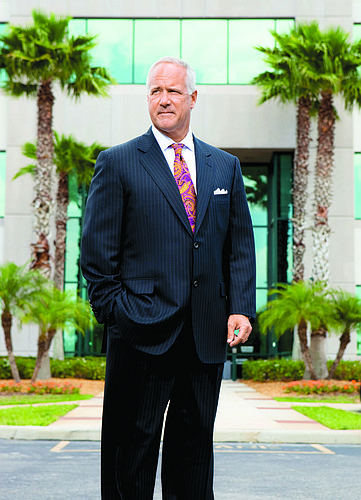- November 26, 2024
-
-
Loading

Loading

David Lewis has been CEO of UnitedHealthcare Florida for the last five years. From his Tampa base, he has overall responsibility for the company's statewide commercial insurance business, which posted $4.2 billion revenue in 2010.
As the state's second-largest provider of health care benefits to companies and their employees, part of his mission is helping small businesses control the rising costs of coverage. It is also a major provider for Medicaid, which will be subject to reform efforts in this year's legislative session in Tallahassee as lawmakers seek to cut those costs.
During a recent interview with the Business Review, Lewis outlined some ways UnitedHealthcare is addressing those issues.
Where does UnitedHealthcare stand among its peers in Florida?
UnitedHealthcare Florida has 2.5 million covered members throughout the state, second perhaps to Blue Cross Blue Shield. Our growth can be attributed in part to the fact that customers like the variety, and more importantly the affordability, of the products we offer.
Here in Florida alone, our members have access to a network of 27,907 physicians and 229 hospitals. Nationally, we operate the largest single network available, with more than 630,000 physicians and care providers and more than 5,000 hospitals. The ability to respond to local needs but with national resources gives customers innovative programs, service, and technology applications.
What is UnitedHealthcare doing to help companies keep employee health coverage costs in check?
Florida was the first state where we began offering a new plan design catered specifically to small business owners called Edge. By accessing care from specialty physicians who meet UnitedHealth Premium designation program criteria for quality and cost-efficiency, Edge plan participants can reduce their out-of-pocket health care expenses, including lower co-payments for office visits and higher co-insurance coverage.
For example, if a member seeks care from a specialty physician who has been designated for quality and cost efficiency, he or she would pay a $30 office visit co-pay instead of $60. This has been a very successful new product in Florida because it has helped contain health care costs for small business owners. This is the kind of value companies like UnitedHealthcare can provide to employers and individuals, and it has been very favorably received in the market.
What effects do you see Medicaid reform in Florida having on businesses and health insurers statewide?
We need to recognize the status of Florida as it relates to the rest of the country. According to America's Health Rankings, Florida ranks 33rd in the nation for childhood poverty with 21% of children under age 18 living in poverty. Additionally, in the last decade the prevalence of obesity statewide increased from 18.6% to 25.9% of the population.
Clearly, Florida faces some significant challenges and we have a wonderful opportunity to expand our long-standing public/private partnership to cover more Floridians, including those in rural areas and the chronically ill. If we are able to do this, it will demonstrate that private industry can improve quality and reduce cost even for those who are most vulnerable.
What changes do you anticipate under ObamaCare in its final form?
UnitedHealthcare is committed to applying our experience serving 70 million Americans to help make the Patient Protection and Affordable Care Act a reality. We worked closely with employers, brokers and consultants as several components of the new health care law took effect Sept. 23, 2010, to ensure their plan designs offer these expanded benefits as appropriate.
Our employees are dedicated to modernizing the health care system. We were the first insurer to extend coverage early for graduating college students ahead of the dependent coverage provision, and the majority of our plans already cover the full cost of preventive care. We will also continue to advocate for the more fundamental action needed to contain rising health care costs and make quality care affordable and sustainable for all Americans.
If you had the power, what changes would you implement to make health care coverage less costly for businesses?
Ultimately, the best result for long-term success in addressing consumers' need for access, quality and efficiency will be delivered in an environment where the plan sponsors, the insurers and the care providers are aligned in a consumer-centric focus. We need to better coordinate the economic incentives so that the emphasis on getting and keeping people healthy is just as important as treating them when they have serious medical conditions.